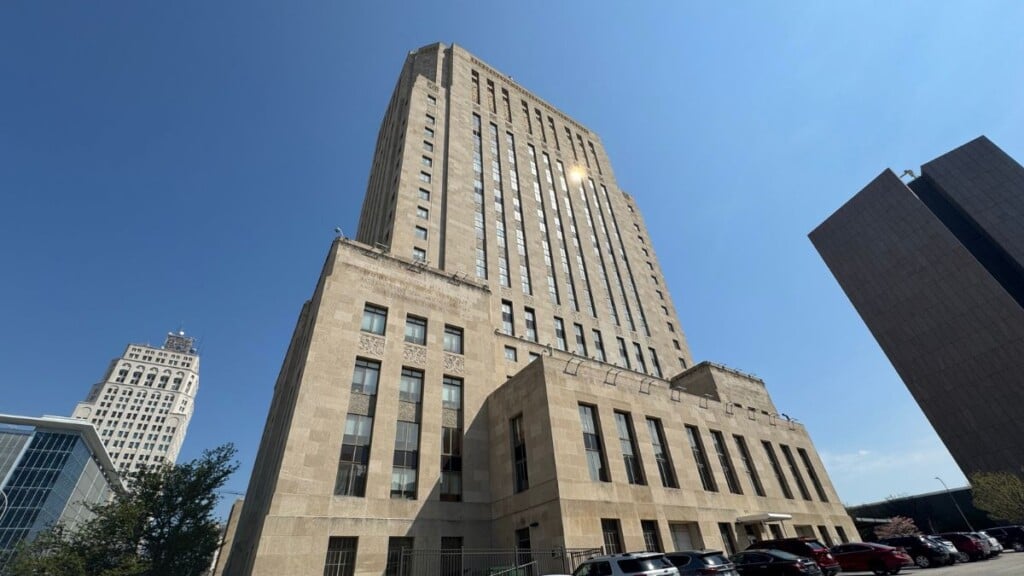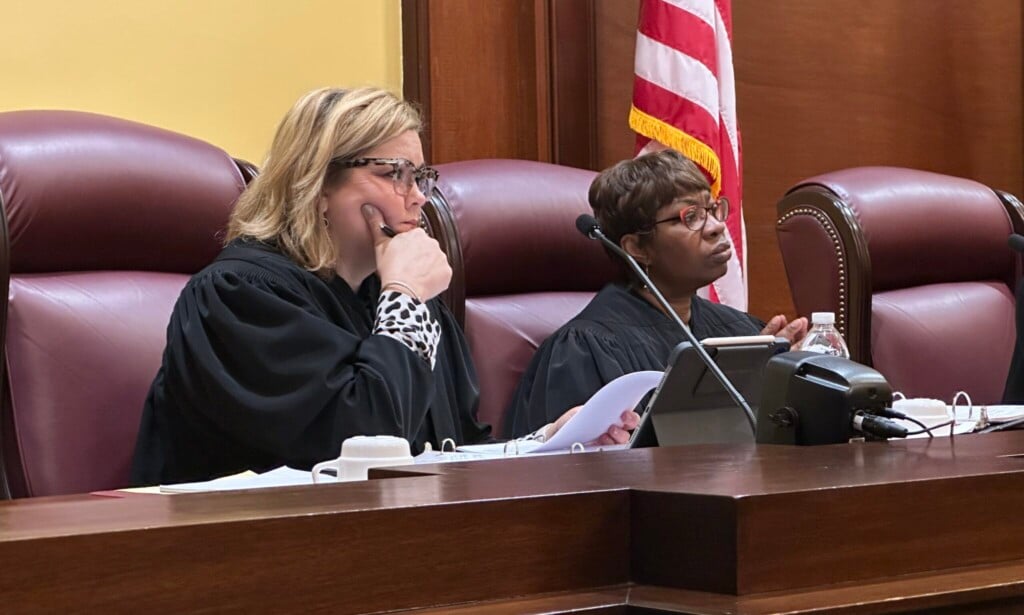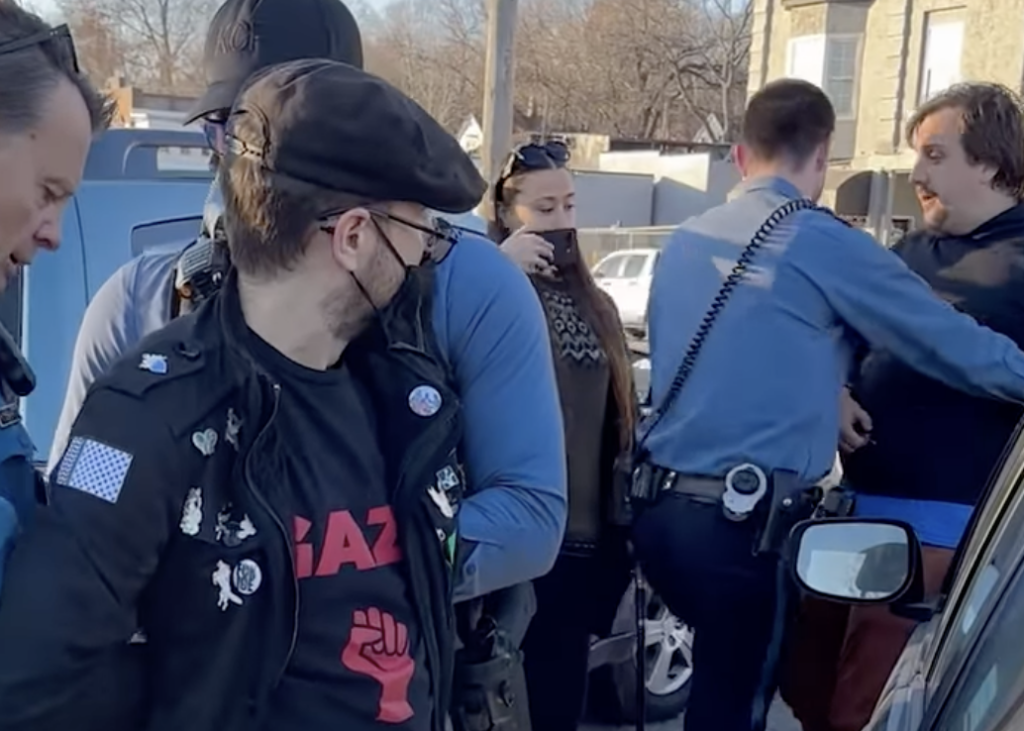Boston Corbett is part of Kansas Statehouse history. His madness offers a lesson in fanaticism.

An artist’s impression, published in 1920 in the Dearborn Independent, of Boston Corbett confronting a Cloud County, Kansas, court convened to determine his sanity. (Library of Congress)
Nobody in Kansas — or just about anywhere else — had heard of Boston Corbett before April 1865. After, as the man who had killed Abraham Lincoln’s assassin, his name would become a synonym for patriot.
But when he came to Kansas years after the Civil War, his name would take on yet another meaning: madman.
I’ve been pondering the strange story of Corbett for some years now, collecting newspaper clippings and perusing book chapters, and the more I know the greater mystery his life becomes. The riddle is all the deeper because it transcends the facts of one man’s life and hints at the political psyche of the nation to come.
A 33-year-old sergeant in a New York cavalry regiment at war’s end, Corbett had by that time endured in relative obscurity a series of trials that might have broken others: the death of his wife, Susan, in childbirth; a surrender to alcoholism; five months in the dreaded Andersonville prison camp. The hell of the Confederate prisoner-of-war camp in Georgia, with its rampant sickness and starvation, would have been enough to drive most to madness, but Corbett was apparently already quite mad by the time he joined the Army.
Born in England, Corbett came to America with his parents at the age of 7. His trade before becoming a soldier was that of hatter, when he still called himself Thomas Corbett, and the mercury vapors he would have inhaled while curing felt may have resulted in some neurological pathology. Whatever the source, his particular madness manifested itself as religious mania. After being persuaded by a street preacher in Boston to give up the bottle and devote his life to religion, Corbett changed his first name to the city where he was saved and became a religious fanatic of the first order. He was called the “Glory to God” man because of the phrase he would repeatedly shout during street-corner sermons. All the while, he was fighting sexual urges he considered impure.
On July 16, 1858, Corbett castrated himself with a pair of scissors.
“Records from Massachusetts General Hospital note that he afterward ‘went to a prayer meeting, walked about some and ate a hearty dinner’ ” before seeking medical help, according to a 2015 biography by Scott Martelle.
By most accounts, Corbett was a rather short and slender man, who wore his hair long because that’s the way Jesus wore it. Corbett’s hair was parted down the middle in a way that must have seemed old-fashioned even then, and he had a wisp of a beard, thin fingers and hard bright eyes.
When the Civil War came, he joined the Union cause but was frequently in trouble for objecting to the profanity used by his commanding officers. After his release from Andersonville, during a prisoner exchange, he was promoted to sergeant. Then, on April 14, 1865, the actor and Confederate sympathizer John Wilkes Booth assassinated Abraham Lincoln at Ford’s Theatre in Washington, setting into motion a chain of events that would bring Corbett fame, whether he wanted it or not.

A fanciful illustration of the shooting of John Wilkes Booth in a burning barn in Virginia in 1865. (Library of Congress)
Nearly two weeks after the assassination, Corbett was part of a detachment that discovered Booth hiding in a tobacco barn in Virginia, about 70 miles outside Washington. Booth was in a bad way, having broken his leg either from the leap from the theater balcony or during a later fall from his horse, but he was well-armed and ready to make a stand after the last of his fellow conspirators abandoned him. The barn was set ablaze, in an effort to drive Booth out, but the soldiers were under orders to take the assassin alive.
Corbett was watching Booth from the gaps between the boards siding the barn. By his own account, Corbett took aim with his revolver and fired a shot that struck Booth in the head. Corbett later said he had aimed for the body, but that Booth had stooped at the moment he had fired, perhaps to pick up a weapon. The shot was a fatal one, as Booth was dead within hours.
Corbett became an overnight celebrity for avenging Lincoln’s death.
By 1885, like many Union veterans, Corbett had relocated to Kansas, homesteading an 80-acre plot near Concordia. He hired men to build a dugout into the side of a hill, where a spring flowed, and the spring was incorporated into the design of the one-room structure. Neighbors recall he seldom, if ever, allowed visitors into the dugout. Under a tree nearby, Corbett had dug his own grave, for use when the time came.
In 1929, Albert T. Reid, a native of Cloud County, wrote about Corbett for Scribner’s magazine.
“In my younger days I was a neighbor of Boston Corbett and knew him quite well,” Reid recalled. “And indeed he was a ‘man of mystery’ — a strange, curious. brooding, eccentric character.”
He was not haunted by the killing of Booth, according to Reid, but he was haunted by some dark cloud. Corbett believed he was being trailed by a secret society of former Confederates who were waiting for their chance to avenge the killing of Booth.
Reid recalls that Corbett was such a crack shot that he would often be found lying on his back in the grass, a rifle to his shoulder, shooting hawks and crows from the sky. Corbett had a pony he loved called “Billy.” He wore a pair of revolvers everywhere, even to church. When the young Reid would dare a glance into the windows of the dugout, he saw that it was bristling with guns.
In 1885, after chastising a group of young farmers for playing baseball on Sunday (in some accounts) or cutting across his property (in others), Corbett brandished a revolver or fired a rifle in their general direction. Either way, Corbett was brought up on charges in a Cloud County courtroom. While on the stand, Corbett pulled a revolver and announced court was adjourned, causing a mad scramble of court officials and spectators to vacate the room. Then he rode Billy to his dugout and holed up, with the Cloud County officials deciding it was best just to leave Corbett alone.
On Jan. 12, 1887, through the influence of a local politician, Corbett was made one of the doorkeepers of the Kansas House. His celebrity must have played no small part in the choice, but the results — given his paranoia — were predictable.
Corbett was convinced that others were talking about him, laughing behind his back and blaspheming, and on Feb.15 he pulled his pistol. Business in the Statehouse came to a halt while some tried to persuade Corbett to give up his weapons (he had a knife, too). Topeka police were summoned, and after a standoff of a few hours, they rushed Corbett and pinned him to the floor.
The next day a judge sent him to the state insane asylum in Topeka.
But in May 1888, Corbett, who had been on a supervised walk with some other residents, bolted. He took a pony that had been hitched to a rail and made his escape. His objective was taken to be the Capitol, where he had vowed to do some “wholesale slaughtering,” according to the Topeka Daily Commonwealth. But Gov. John Martin dismissed the threat, saying “Boston isn’t going to hurt anybody.”
Instead of wreaking mayhem at the Statehouse, Corbett turned his borrowed pony 120 miles south, to Neodesha. There, he stayed briefly with Richard Thatcher, a friend he had made at Andersonville who was now a superintendent of schools. Then, on June 1, 1888, with $15 in his pocket, Corbett left arrangements for the borrowed pony to be returned to its owner, and boarded a train at the Neodesha depot.
He said he was heading for Mexico.
That was the last known sighting of Boston Corbett.

Boston Corbett, the man who killed John Wilkes Booth, in a War Department photo likely taken in 1865. (National Archives)
There is some circumstantial evidence that Corbett may have died in 1894 during the Great Hinckley Fire of the pine forests in Minnesota, which killed at least 300. But there is no conclusive proof that a man called Thomas Corbett who died in the fire was indeed the Topeka fugitive. As fitting as it would be for Corbett to have died in a fire — just as Booth received his coup de grace in a burning barn — the matter remains unresolved.
There were others who claimed to be Corbett, including a man who sought his government pension in 1905, but none were convincing. The grave that Corbett had prepared for himself near his dugout in Cloud County would forever go unused.
The last chapter in the Corbett story remains unwritten. Did he really go to Mexico? Was a secret society of former rebels truly hounding him? Did God direct his hand in killing Booth, as he claimed after the fact, or was he just a soldier with a talent for disobeying orders?
Does it matter? Well, I would like to ask him why the hell he castrated himself and then went and ate a hearty meal. That’s just crazy.
Why was he a hero for so many?
Since the Civil War, American politics have been influenced by a folk appetite for just the kind of behavior Corbett exhibited in abundance. There’s the gloss of celebrity, the desire for vengeance, the extreme displays of religiosity, the paranoia regarding one’s enemies, the intractable opinions, the yearning to reach for a gun to settle disputes.
Corbett was undoubtedly mad as a hatter, but he was mad in a peculiarly American way. He had suffered tragedies in his life unimaginable to most of us, but his responses were so extreme that it tested the very institutions — medical, judicial, religious — he professed to serve.
He defined himself by what he was against, not what he was for.
Corbett’s fame was forever bound up with the killing Booth, who with his dying breath proclaimed his patriotism. And, like Corbett, the assassin believed he was carrying out God’s plan.
“Our country owed all her trouble to (Lincoln),” Booth wrote in a journal that was found on his body, “and God simply made me the instrument of his punishment. The country is not what it was.”
Booth, also, had a plan to escape to Mexico.
Three U.S. presidents were assassinated in the 36 years after the end of the Civil War. A fourth president, John F. Kennedy, was killed in 1963, and his assassination was avenged by nightclub owner Jack Ruby. The remainder of the 1960s were filled with the assassinations of a presidential candidate, religious leaders and civil rights activists.
One hundred and fifty-nine years after its end, we still have not come to terms with the cause of the Civil War (it was slavery) or the political violence that followed. Corbett and Booth remain locked in death, American fanatics who present us with a cautionary tale about extremism, if only we would listen.
Max McCoy is an award-winning author and journalist. Through its opinion section, the Kansas Reflector works to amplify the voices of people who are affected by public policies or excluded from public debate. Find information, including how to submit your own commentary, here.
Kansas Reflector is part of States Newsroom, a network of news bureaus supported by grants and a coalition of donors as a 501c(3) public charity. Kansas Reflector maintains editorial independence. Contact Editor Sherman Smith for questions: info@kansasreflector.com. Follow Kansas Reflector on Facebook and Twitter.




